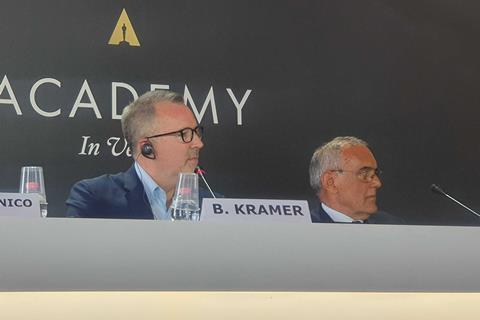
The theatrical requirement for films to qualify for the Oscars “will not go away”, according to new Academy CEO Bill Kramer.
Speaking on a panel about ‘The values of cinema in global society’, Kramer said, “The theatrical eligibility requirement will not go away, I believe – the theatrical experience is very important to us.”
However, Kramer was equally effusive about streaming, saying that “Netflix is making incredible movies” and that the Academy has “great respect for Ted Sarandos, Reed Hastings [co-chief executives] and Scott [Stuber, head of global film, all at Netflix].”
“Theatrical and streaming will continue to coexist – that’s a good thing,” he added. “I envision the Academy supporting a world where [they coexist].”
Speaking alongside Kramer were Biennale president Roberto Cicutto; Alberto Barbera, artistic director of the festival; Chiara Sbarigia and Nicola Maccanico, president and CEO respectively of Cinecitta; and Michele Centemero, country manager Italy for sponsor Mastercard.
Cicutto and Barbera echoed Kramer’s words on streamers, with the former saying the companies “should be turned into partners with which we can find a balance.”
The artistic director did close his remarks by saying that “theatres remain the best and most passionate experience to enjoy a great movie.”
This is the first time in the festival’s 90-year history the Academy has sent an official delegation to Venice.
Research by Screen in 2019 revealed that Venice has become by far the most prolific festival for premiering Oscar nominees and winners, with 12.5% of nominees and 13.6% of winners over the last 20 years having debuted on the Lido.
The Academy “will continue to grow” its presence at the festival, said Kramer. “I see this as the beginning of a deepening of our relationship and we’re incredibly excited about that.”
The success of Venice films at the Oscars is down to “the experience of the selection committee”, according to Barbera. He noted that Warner Bros was surprised when he suggested that Gravity open the festival in 2013. ”Studios had not understood the potential of film festivals,” he said, which “give films greater possibility to attain marketing and success.”
Realignment of values
Kramer said he liked the vision of the Oscars as “the Olympics of cinema”, and reaffirmed the Academy’s commitment to continue to expand its international membership. Barbera in turn said this would lead to Venice becoming “more and more relevant in the future” with its promotion of international cinema.
Discussing a “realignment of values” in the industry, Barbera said Venice must be part of “putting to the forefront inclusion, diversity, gender diversity issues.”
A “critical shift in the industry is a consequence of the social revolution started with #MeToo, and the becoming aware of behaviours that have become no longer acceptable today, when they were accepted in the past. Machismo and racism in particular,” said the director.
Kramer also re-addressed the steps the Academy has taken in light of the Will Smith-Chris Rock incident at the 2022 ceremony, saying the Academy “plans to have a host” for next year’s event.
”We plan to have a host this year, that’s very important to us – I think it’s very grounding to the show,” said Kramer, speaking on a panel in Venice about ‘The values of cinema in global society’ ahead of the opening of Venice Film Festival tomorrow. ”All of that is in early stage conversations.”
“We’re working hard to create a show that celebrates cinema, all of the disciplines,” he added - which will be welcome news to many in the industry who were displeased by the omission of some disciplines from the 2022 telecast.
The panel took place in the new Venice press centre atop the Palazzo del Casino on the Lido; with the previous press area having been converted to a screening room.
This evening Kramer will attend a cocktail reception on the main Venice lagoon, before attending the festival opening tomorrow (August 31); and meeting Academy members attending the festival on Thursday (September 1).

























No comments yet